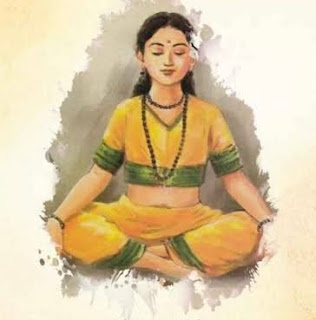Taatiche Abhang: Abhang 5
Taatiche Abhang: Abhang 5
Shorter version
संत तेचि जाणा जगीं ।
दया क्षमा ज्यांचे अंगी ॥१॥
लोभ अहंता न ये मना ।
जगी विरक्त तोची जाणा ॥२॥
इह परलोकीं सुखी ।
शुद्ध ज्ञान ज्यांचे मुखीं ॥३॥
मिथ्या कल्पना मागें सारा ।
ताटी उघडा ज्ञानेश्वरा ॥४॥
Recognize saints as those who have the virtues of mercy and forgiveness in them.
Those who don’t entertain greed or egoism in their thoughts
Only those can be considered as being truly detached from worldliness.
They avail of bliss in this world and in the afterlife
Those whose speech reflects pure knowledge.
Leave behind all false ideas and vain hopes
And open the door oh Dnyaaneshwara!
संत saints
तेचि those
जाणा know
जगीं in the world
दया mercy
क्षमा forgiveness
ज्यांचे whose
अंगी within
लोभ greed
अहंता ego
न ये doesn’t enter
मना ( in the)mind
जगी in the world
विरक्त renunciate
तोची that one, him alone
जाणा know
इह here
परलोकीं other world
सुखी happy
शुद्ध pure
ज्ञान knowledge
ज्यांचे whose
मुखीं ( in the) mouth/ speech
मिथ्या false
कल्पना ideas, imagination
मागें behind
सारा push
ताटी उघडा ज्ञानेश्वरा open the door O Dnyaaneshwara
संत तेचि जाणा जगीं ।
दया क्षमा ज्यांचे अंगी ॥१॥
लोभ अहंता न ये मना ।
जगी विरक्त तोची जाणा ॥२॥
The first half of this abhang details attitude of a true saint. What distinguishes saints from others? A kind heart! Whenever we see a person with a kind heart we label him as a saintly person. It comes naturally to men of spiritual integrity to show benevolence towards those they come in contact with. Forgiveness is built into their attitude. The suffering of others bothers them and they don’t stop at mere expressing sympathy. They don’t hesitate to give up their own needs and comforts to alleviate the distress of others. Do read the life story of Sant Tukaram. There are so many instances when he was struggling to feed his own family yet he didn’t think twice to give away whatever was in his possession when he saw someone else in need. There were people who made his life miserable in numerous ways. And despite this Tukaram Maharaj showed kindness and forgiveness towards them. Muktabai says this is true detachment, true renunciation. Putting one’s own needs aside for others. Keeping compassion in the heart rather than false pride.
इह परलोकीं सुखी ।
शुद्ध ज्ञान ज्यांचे मुखीं ॥३॥
मिथ्या कल्पना मागें सारा ।
ताटी उघडा ज्ञानेश्वरा ॥४॥
The latter half of the abhang delves into philosophical concepts. Sanatan dharma popularly known as Hinduism is more of a basic science than religion. Much like physics, chemistry and biology. To understand this there are numerous texts which any earnest student can study, apply logical reasoning and conduct experiments to ascertain facts. Based on the principles of this science cum philosophy there is a definite criteria for Truth. That which cannot be negated under any circumstances is Truth. The consciousness in us is truth. The substratum of all manifestations is truth. All changing phenomena in the universe are superimposed upon truth. This includes human birth, growth, aging and death.
If we identify with the changing manifestation of ourselves we would be in transition from one cycle of birth to death followed by another. The world that we recognize during one such birth cycle is what Muktabai is referring to as इहलोक. The world we will move on after death will be परलोक.
Imagine we are sitting next to the window in the first class compartment of a train . After the train leaves the station and the city surroundings it enters into area of greenery, mountains, rivers. There are clouds hanging over hills, rainbow in the sky, cattle grazing in the meadows. You soak into the paradise as you move and want it to stay like that forever. Alas the train crosses the beautiful landscape and enters into dirty urban sections nearing the last station where you have to get off. Your moments of happiness come to an abrupt halt along with the train journey. Because that happiness was contingent upon what you were seeing outside.
When a person learns to disengage his identity from the changing manifestation of himself he steadies in pure consciousness. He finds the source of bliss within that consciousness. The state of pure consciousness and its first hand knowledge is what is referred to as शुद्ध ज्ञान here. For this person the joy that is experienced in the present cycle of birth and death is not going to vanish at the end of the cycle. It is his to keep for the onward journey after the physical body is left behind. इह परलोकीं सुखी ।
From the perspective of pure consciousness everything else is temporary hence it is categorized as unreal. मिथ्या. This includes our body identity or ego as well as the world of objects. Muktabai implores her brother to give up all ideas based on such impermanent, imperfect and unreal premises. Figuratively speaking she tells him steady yourself in the eternal reality or Truth which is pure consciousness and open the doors of your heart with that knowledge.
The concepts from this abhang to contemplate upon:
दया क्षमा ज्यांचे अंगी
And
शुद्ध ज्ञान ज्यांचे मुखीं



Comments
Post a Comment